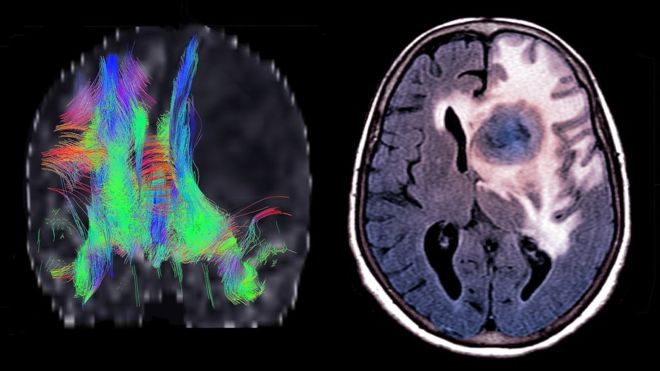The use of a common virus in the fight against brain cancer

A number of scientists have expressed optimism about finding a possible treatment to help people with incurable brain cancer.
Ten patients have so far been hospitalized in Britain for the new treatment, a virus that causes symptoms similar to the symptoms of intermediate flu.
Preliminary studies have suggested that the virus can cross the blood barrier in the brain and may help "activate" immune systems in the body to attack the tumor.
Experts at Leeds University and four other research centers are planning to treat more patients with viruses.
Although the new treatment does not cure, scientists hope it may be useful as an addition to traditional treatments, such as chemotherapy, radiation and newer immunosuppressants, which may prolong the patient's life for weeks or months, and possibly for years to come.
It is too early to see if the effect of HIV treatment, if there is a trace, is to survive, but researchers hope that with further studies, they will be able to find out.
Dr. Colin Watts, an expert on brain tumors at the Cancer Research Center in the United Kingdom, told the BBC that it was "an exciting first step in the journey toward clinical use."
"The scientists, working with surgeons and oncologists, have shown that the virus penetrates the tumor and does what it is supposed to do - awakening the immune system to monitor cancer."
"Clinical trials do not yet reveal whether this wake-up call is enough to kill cancer cells and help improve the survival of patients with tumors in the brain."
How it works?
The virus can be injected into the patient's blood, instead of injected directly into the brain, which doctors say may be less dangerous and appropriate for patients.
Researchers say the virus, called the ribosomal virus, tends to infect cancer cells, leaving largely healthy cells alone.
Patients receiving this treatment said they had side effects, similar to those associated with a moderate flu.
So far, scientists have thought the virus is unlikely to pass from blood to the brain because of the protective membrane surrounding the brain, called the blood barrier in the brain.
In the first patient undergoing treatment, it was proven that the virus had successfully crossed and reached its target.
An analysis of tumor samples revealed that the virus helped alert and mobilize the body's immune system to attack cancerous tissues.
The results were published in the journal Science Translational Medicine.
"Our immune systems are not very good at seeing cancer, in part because cancer cells look like other cells of the body, partly because cancer cells tell immune cells to blink," says Professor Alan Melcher of the Cancer Research Foundation, which co-sponsored the study. But the immune system is very good at seeing viruses. "
"In our study, we have been able to prove that the ribosomal virus can infect cancer cells in the brain and, more importantly, the brain tumors that have become infected with the virus become more pronounced for the immune system."
The results urged other doctors to recruit new patients, in order to experience a full share of treatment.
Susan Short, a professor of clinical oncology at the University of Leeds, has already started treating a patient in her custody.
Short says there are early signs, that other "less harmful" viruses may work better to prepare the body, to combat these highly aggressive types of cancer more strongly.
"We hope it will eventually lead to a treatment that has a big impact, but we do not know yet."
"The brainworms are taking many lives, the only way to change that is through study and research," said Sarah Lindsell, executive director of the charity Brain Tumor Epidemiology, which co-sponsored the study, which will be welcomed by both the University of Leeds and the Cancer Research Institute. They know very well the devastation caused by this severe disease. "
According to figures from Cancer Research UK, about 11,000 new cases of primary brain cancers are diagnosed in the UK each year.
Only 14 percent of patients live for 10 years or more after being diagnosed with primary or malignant brain tumors.